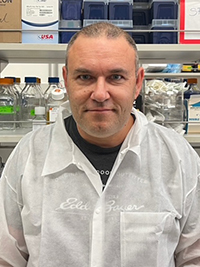
Assistant Project Scientist
General Surgery
University of California, Los Angeles (UCLA)
Los Angeles, CA
Comparison of acinar and ductal cell driven PDAC development promoted by obesity
Overview
Aim: Biology
Pancreatic ductal adenocarcinoma (PDAC) continues to be one of the most lethal human diseases, with an overall 5-year survival rate of just around 10%. An estimated 48,220 people in the US will succumb to this disease in 2021, putting pancreatic cancer as the third leading cause of cancer mortality in women and men combined. Alarmingly, the incidence of pancreatic cancer has increased over the last years.
A detailed understanding of modifiable risk factors, e.g. obesity, will most likely guide the rapid implementation of new preventive strategies. We have confirmed that PDACs differ in histology, severity, and outcome depending on whether they arise from acinar or ductal cells. It is also known that obesity has been shown to promote and accelerate PDAC development. However, the distinctive impact of obesity on PDAC arising from acinar versus ductal cells is unknown.
While acinar-derived PDAC develops through the usual acinar-ductal-metaplasia (ADM)-pancreatic intraepithelial neoplasia (PanIN)-PDAC sequence, duct-derived PDAC developed in the absence of PanINs or other mucinous precursors indicating an alternative progression route of PDAC. Importantly, mice with duct-derived PDAC had a significantly shortened survival suggesting a differential prognosis of PDAC of different origins. It has not been investigated so far whether Diet-Induced-Obesity (DIO) can also promote PDAC development in a duct-derived PDAC model. In this aim we will investigate and compare the effects of DIO on acinar- and duct-derived PDAC development in inducible KrasG12D mouse models. We hypothesize that DIO can promote PDAC development in a duct-derived model of PDAC and that PDAC development in a duct-derived model promoted by DIO progresses faster and more aggressive compared to an acinar derived model.
In this current study, the efficacy of obesity on PDAC development in acinar cell and ductal cell derived PDACs will be compared. The proposed exploratory studies are of great significance as they will illuminate PDAC biology, detect potential differential responses to risk factors (obesity), and could identify better markers for patient stratification and treatment options.